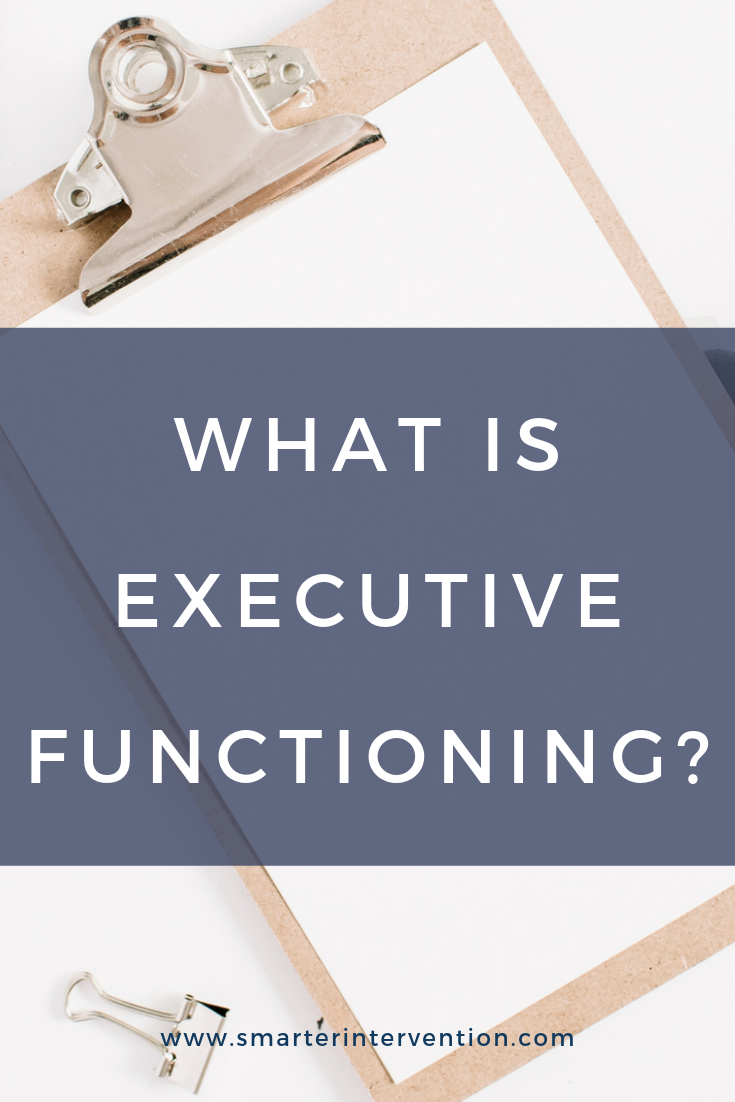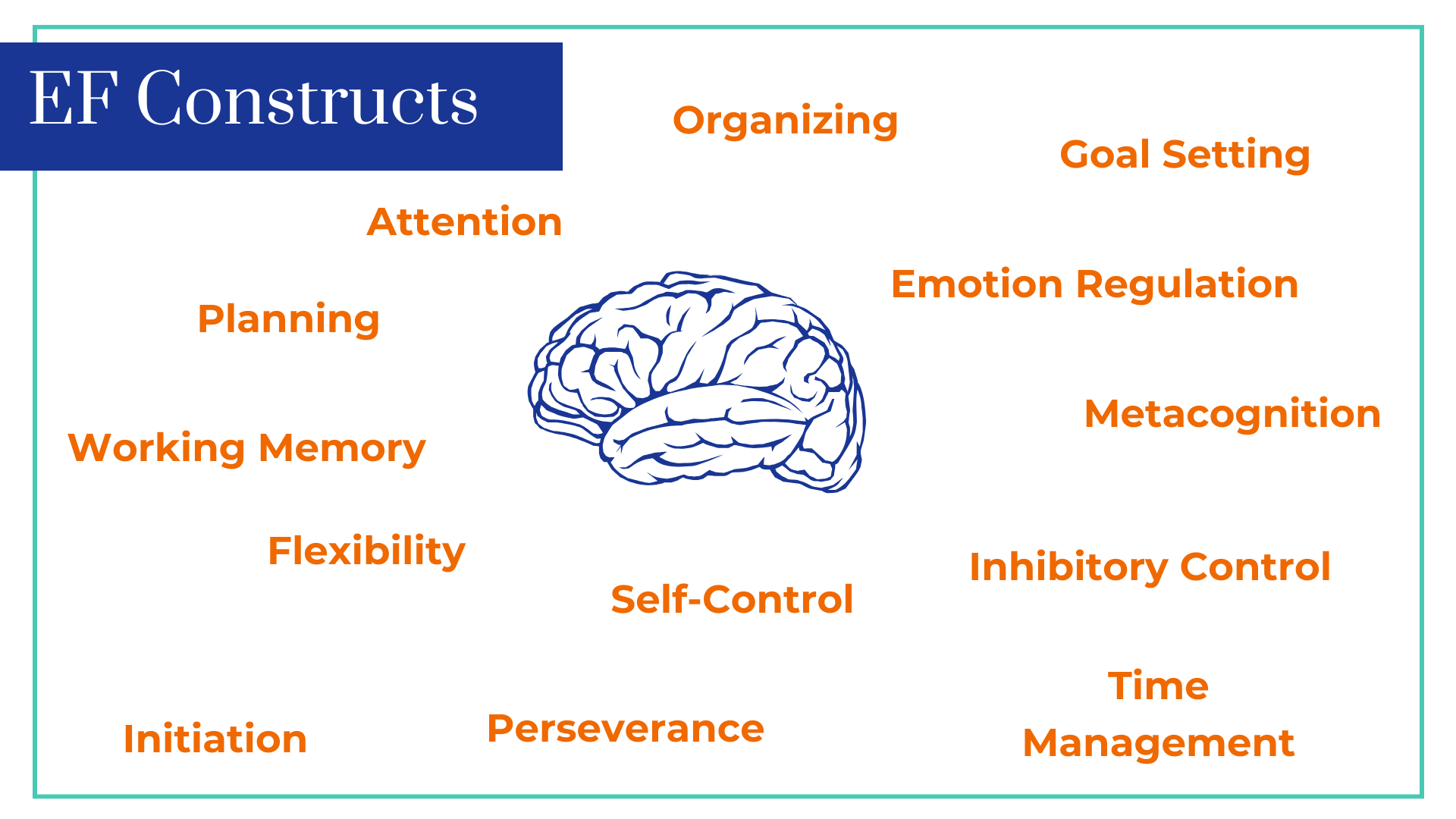What is Executive Functioning?
Everyone seems to be talking about Executive Functioning (EF), but what exactly is it?
Executive functioning is an umbrella for the skills we need to set and reach goals.
Now when we say “goals” we can mean this very broadly.
For example, one goal might be completing an assignment or project. Another goal might be getting ourselves ready to get out the door in the morning. A longer-term goal might be getting into college or running a marathon.
We have several “goals” we need to achieve every day to be functional in society. The tricky part about this is that many skills need to come together for us to set and reach goals.
Executive functioning requires foresight (our ability to imagine ourselves in the future), hindsight (our ability to reflect on what’s been done/what’s worked in the past), and self-awareness across time to see how we’re progressing toward our goals.
What are the Executive Functioning Skills we need?
Well, this becomes a long answer because there are MANY skills and multiple definitions or constructions of these skills.
Some common skills that fall under this umbrella include attention, planning, organizing, working memory, flexibility, initiation, self-control, perseverance, emotion regulation, metacognition, inhibitory control, time, management, goal setting… the list goes on and on!
You can research any of these terms and get very complex definitions and strategies to support each area. However, at the end of the day - if you want to meet and achieve goals (like getting out the door in the morning, completing a project or assignment, or reaching a longer-term goal), you need to have a system that supports each of these skills.
How do we develop executive functioning skills?
Now this becomes the real question. Especially because so many students struggle with executive functioning. We put together a 5-Step EF Framework that helps us more easily conceptualize each of these skills and how we can use them to set and achieve goals.
Step 01 - Goal Setting
We need to understand what our goal is and why it matters to us. For example, if we need to get out the door we need to understand that our goal is to get out the door with everything we need and make it to our location on time. This matters to us because we want to get to the place we’re going (e.g., school, work, the swimming pool) to accomplish XYZ. At this step, we can ask ourselves the following questions:
What is the goal?
Why is it important?
What will I get when I’ve achieved the goal?
What might block me from getting this done?
How does this goal fit into other priorities/my schedule?
Step 02 - Regulation
Next, we need to be able to regulate ourselves in order to meet our goals. We need to understand if our emotions or responses to our emotions are impacting our ability to reach our goal. We can ask ourselves:
What is my current state/how am I feeling/how would I label this emotion?
What can this state cause and activate?
What do I need to be aware of?
What are the strategies I can use?
For example, I might check in with myself and label my emotion as angry. I can recognize that anger may cause a “fight” response and activate aggression so I may need to be aware of possible verbal or physical aggression (emotion regulation). Once I have that self-awareness, I can implement strategies like drinking a glass of cold water instead of shouting at someone (inhibitory control).
Being able to identify our emotions, be aware of our body’s response to those emotions, and then having strategies to help shift us or get us into action is critical in reaching our goals.
Step 03 - Attention
Next, we need to be able to direct our attention. We need to have an awareness of ourselves, our environment, and where we need to be focusing to meet our goals. Some questions we can ask:
Where is my attention? (Self-Awareness)
Am I able to hold onto the information I need? (Working Memory)
Do I need to redirect my attention for success? (Metacognition & Perseverance)
Holding onto the information we need requires working memory. Working memory is required to be able to follow directions, remember things we hear, sound words out, and solve math problems. Sometimes it may seem that we aren’t “paying attention” when in reality we are struggling with holding onto the information we need in our short-term working memory. In this case, we need to implement strategies to help us attend to the key information by using tools like visuals, checklists, and motor cues (like putting each step on a finger to remember how many steps there are).
We also need to be able to recognize when our attention isn’t directed or sustained appropriately. Sometimes we just don’t recognize that we aren’t paying attention or aren’t grasping something - we call this having poor metacognition. Sometimes, we just struggle to continue doing something that is difficult (limited persistence or perseverance).
Step 04 - Planning
Technically, this step is about planning, doing, and getting started - but it all starts with a plan. Some questions we want to consider here include:
What am I trying to accomplish? What does done look like? (Planning)
What needs to happen step-by-step? (Organizing)
How long will each step take? (Time Management)
What do I need to have ready? (Preparation)
Can I get started? (Initiation)
This process allows us the opportunity to think about what we are trying to do and break it down into meaningful steps.
Step 05 - Reflection
The last step is an opportunity for reflection. We can reflect before, during, and after we actually start “doing” the action required to meet our goal. These questions might look like:
What will I do if I get stuck? (Flexibility)
Am I where I should be/did I meet the goal?
How did the process go?
Are there other directions or perspectives to consider?
What might I do differently next time?
It’s important to recognize -
Everyone has different strengths and weaknesses when it comes to EF. This can pose different challenges for students. A student might have great self-control and can sit quietly in class, but have poor planning skills. Another student in the same class might be able to plan out their weeks down to the minute, but because they struggle with task initiation, none of their planning ever offers much benefit to their school work. This combination looks different for everyone, so it’s important to begin to recognize where those strengths and weaknesses exist in order to create strategies to help manage them.
If you’re looking for support in helping your child develop these skills, contact us to learn more about our executive functioning skills training!







